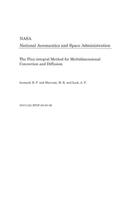
The Flux-Integral Method for Multidimensional Convection and Diffusion
Series:
The flux-integral method is a procedure for constructing an explicit, single-step, forward-in-time, conservative, control volume update of the unsteady, multidimensional convection-diffusion equation. The convective plus diffusive flux at each face of a control-volume cell is estimated by integrating the transported variable and its face-normal derivative over the volume swept out by the convectin
NaN
VOLUME
English
Paperback

The flux-integral method is a procedure for constructing an explicit, single-step, forward-in-time, conservative, control volume update of the unsteady, multidimensional convection-diffusion equation. The convective plus diffusive flux at each face of a control-volume cell is estimated by integrating the transported variable and its face-normal derivative over the volume swept out by the convecting velocity field. This yields a unique description of the fluxes, whereas other conservative methods rely on nonunique, arbitrary pseudoflux-difference splitting procedures. The accuracy of the resulting scheme depends on the form of the subcell interpolation assumed, given cell-average data. Cellwise constant behavior results in a (very artificially diffusive) first-order convection scheme. Second-order convection-diffusion schemes correspond to cellwise linear (or bilinear) subcell interpolation. Cellwise quadratic subcell interpolants generate a highly accurate convection-diffusion scheme with excellent phase accuracy. Under constant-coefficient conditions, this is a uniformly third-order polynomial interpolation algorithm (UTOPIA). Leonard, B. P. and Macvean, M. K. and Lock, A. P. Glenn Research Center NCC3-233; RTOP 505-90-5K...
Price Comparison [India]
In This Series
Bestseller Manga
Trending NEWS




















